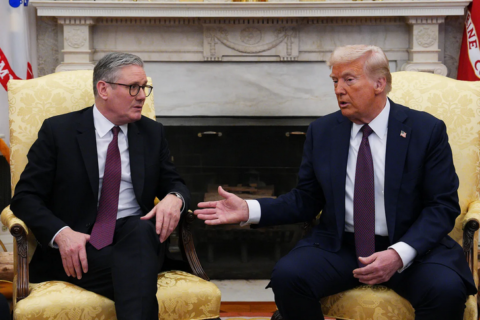As if more evidence were needed that Canadians aren’t well-served by our political leaders, social media personalities and legacy media types are pointing at uninvolved figures to be rounded up as the targets of maple-flavoured Two Minutes’ Hate sessions:
You can’t have an outburst of nationalism without purity tests coming into play, and two prominent Canadian figures have failed theirs in the court of chattering-class opinion: Wayne Gretzky and King Charles III, of all people.
In recent consecutive days, hilariously, The Globe and Mail‘s website published the following headlines to its online readers’-letters pages: “Wayne Gretzky’s fall from grace is a long time coming”; “Let Wayne Gretzky feel some pain”; and “Wayne Gretzky has always been held in the highest regard … now, he is dead to me”.
Gretzky is friendly with President Trump, you see, which is unacceptable. And if Gretzky isn’t willing to publicly disavow Trump, he should be using his influence to sit Trump down and explain that Canada will never be the 51st state … at which point, presumably, something useful is supposed to happen. It’s never clear what that useful thing would be, beyond a cheap nationalist thrill.
Gretzky’s Yankeeism was confirmed when he served as honorary captain of Team Canada in the final game of the 4 Nations tournament in Boston. (Imagine if he hadn’t served as honorary captain!) He gave the American players a thumbs up — which in any other context would have been considered simple good sportsmanship. He didn’t wear a Team Canada sweater, but rather a suit — which in any other context wouldn’t even have been noticed. He didn’t wear his Order of Canada pin — well, now we’re just grasping at straws.
It’s funny that the same kind of people who have no time for the Crown under normal circumstances (even if they’re not quite out-and-out republicans) are delighted to pile on to any accusations that King Charles isn’t doing … something … to fight off the Bad Orange Man for us:
This brings us to our head of state, and the baffling calls in recent days for him to shake his sceptre toward Washington and declare that Canada shall never never never be the 51st state. If these calls were coming just from anti-monarchists, it would be understandable (though it’s odd to hear them suddenly demanding that the sovereign speak on our behalf). But all kinds of otherwise reasonable people jumped aboard as well, as if this was something the King should self-evidently be doing.
It is self-evidently not what the King should be doing — certainly not before receiving advice from the Canadian prime minister, and probably not at all. Charles’s mother wouldn’t have mouthed off, and I have to wonder if she would have gotten the same criticism were she still alive to see this mess.
Indeed, I think a moment like this is precisely when having an apolitical head of state — maybe even one that doesn’t live here — is most valuable. We have more than enough people, elected and unelected, completely and vocally embroiled in the Trump Tariff Wars, pursuing some combination of national, partisan and personal gain. Isn’t it nice to have precisely the sort of democratic constancy the United States now lacks? You don’t throw away an anchor, however rusty, with a gale on the horizon.





















